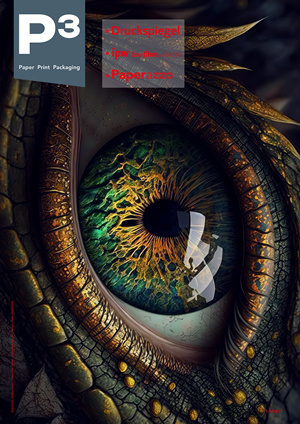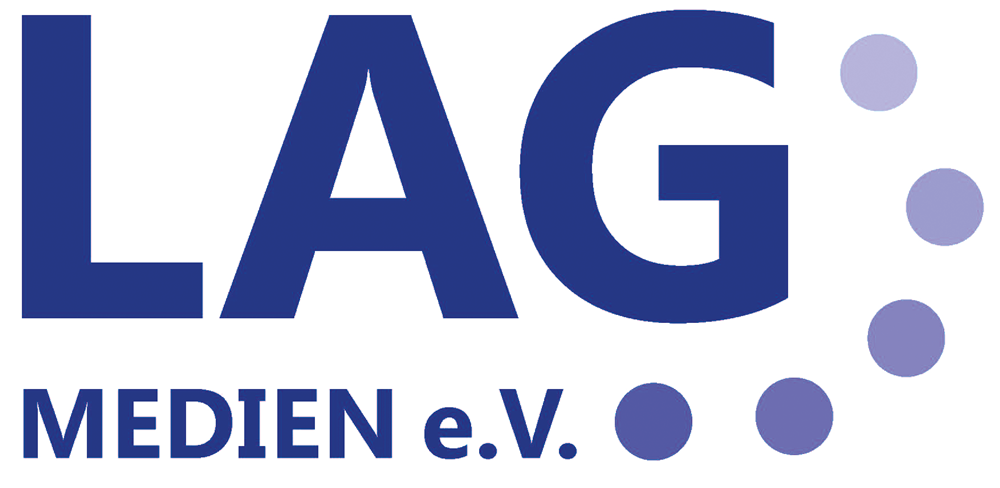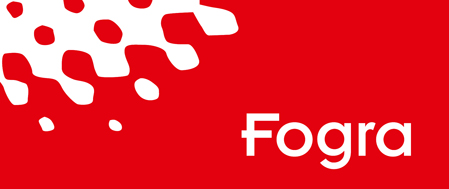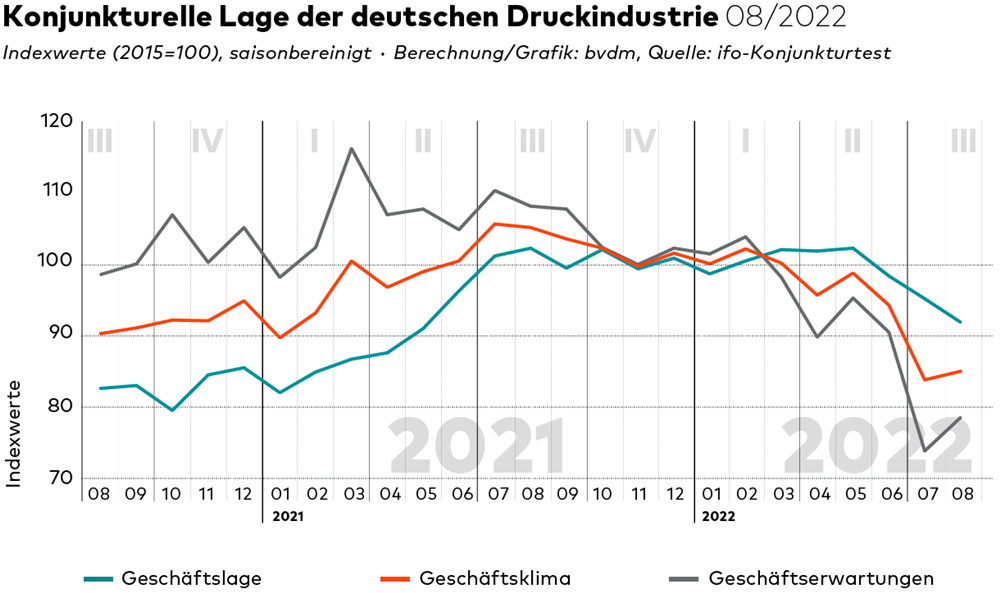P3 5-6/2022 en
The Word on the Situation
"The Nerves of Particularly Affected Companies are on Edge!"
Industry Interview
If you analyze the current situation in the German printing and media industry and consider the interlinking of the various problem areas, questions inevitably arise: How is the printing industry supposed to get through the winter? Is the supply of printed matter guaranteed? Do you have to be thankful if there is only occasional collateral damage? One can answer these questions with optimism or with evasive phrases. Or by speaking plain language. We had a very candid and insightful conversation with Dr. Paul Albert Deimel, General Manager of the Federal Association of Printing and Media in Germany.
Surveyed by bvdm: The business climate of the German printing and media industry in August 2022.
Dr. Deimel, the list of problem areas in the printing and media industry has been shorter. Energy crisis of uncertain extent, war in Ukraine, logistics and procurement problems, price increases on the supplier side that can no longer be sustained, shortage of skilled workers, planning and thus investment uncertainty: In general, the business situation could probably be significantly better. How do you currently experience the mood in the industry?
The mood in the companies varies, but in view of the current development it ranges from little optimistic to despair in individual cases. In times of scarcity, some stockpiled paper, others bought too much of it, and many have been hit hard by the enormous price increases due to energy prices, which are now in the foreground. Speaking of energy: naked fear often reigns in our industry too. Fulfillment of the contract becomes uncertain if the provider breaks away. In individual cases, of course, it also depends on the type of business (gas or electricity-intensive) and, above all, on the contract terms. So the big end is yet to come. We have also recently received reports from companies whose suppliers think they can cancel their gas contracts and thus expose the companies to fluctuations on the spot markets or supply them at significantly worse conditions. Price increases by a factor of 5 to 20 cannot be passed on to customers. This deprives the printers of their business basis and threatens their existence.
In your opinion, are politicians taking the right measures, or do you feel a bit left out in the rain?
Clearly, the nerves of the companies particularly affected are on edge. At the beginning of the Ukraine war, industry was asked to tighten its belts and save gas and electricity wherever possible in order to make Germany independent of Russian energy imports. In return, the industry will be protected from the worst, it said. We have already done our part. According to the Federal Network Agency, industrial gas consumption fell by around 21.5 percent on average in the last two months compared to the previous year. Appropriate compensatory measures, however, have so far been a long time coming. So far, the support programs of the Ukraine protection umbrella have largely ignored the printing industry or are completely unattractive. It was extremely clumsy to try to orient them to the so-called KUEBLL list. Not only the printing industry would be completely outside. This has been recognized by politicians. It is interesting that in almost all discussions with companies, the tenor is: we need price brakes and a cap and less bureaucratic help á la Corona. We have made it clear to the Minister of Economic Affairs, directly and in close cooperation with other business associations, that our companies can hardly pass on price increases. Our companies need an energy market that can be planned in a timely manner.
Most recently, the bvdm spoke out in clear terms and criticized the paper industry, which is constantly calling out price increases “due to the situation” from one window, while record sales and profits are being announced from the next window. At the same time, the profitability of the printing industry is under scrutiny. You recently identified a “difficulty in communication” and demanded: “Agreements deserve validity!” That sounds like a serious loss of trust, doesn't it?
We are in very close and good contact with the paper industry and wholesalers. In this way we can pass on information to our members and create understanding among the suppliers for the problems in our operations. The highest-ranking representatives of the paper industry associations and the German paper wholesale trade were ready twice to answer the questions – and also the criticism – from our entrepreneurs. More than 300 participants have made use of it. It was noteworthy that both supplier channels admitted that they had not always honored contracts. Hopefully new trust can then be based on such an honest admission. Unfortunately, according to our information, there were isolated instances of misconduct again this summer. In principle, however, everyone is interested in good cooperation: we should not lose sight of our common interests!
It is to be feared that the situation could deteriorate further in the coming months. What tools does the bvdm have at national and possibly international level to be able to influence the situation constructively?
You can be sure that the federal association has been working under constant pressure since the beginning of the corona pandemic in February 2020. Even then, we “heated up” politics at all levels. On the one hand, it was about the companies being allowed to continue working, the keyword here being system relevance, while on the other hand, economic and social life should be maintained as well as possible. After all, the printing and media industry depends to a large extent on the other sectors! Our lobbying work is not just about the printing industry in the narrower sense, but about the framework conditions, the markets, the suppliers, the supply chains, and that's the same now. While we were still hoping at the beginning of the year that an economic recovery would set in, things have been looking dramatic for our operations since the war in the Ukraine. Costs are exploding, demand is falling and revenues are dwindling. Alone, but also in close cooperation with particularly large business associations, such as the Confederation of German Employers' Associations and the Central Association of German Skilled Trades, we are in dialogue with politicians. We present our demands, provide figures, data and facts, show economic relationships, advise and support all levels in working out ways out of the crisis.
Ransomware attacks in particular and cybercrime in general have steadily increased in recent months and years and have become a crucial issue at executive and management level, not least because of the extent of the damage. In your opinion, how well prepared is the German printing and media industry to deal with this? Do you see a need to catch up compared to other branches of industry?
Many printing and media companies process third-party data, the acquisition and processing of which entails risks, especially since the attackers' methods are becoming more and more perfidious. Therefore, our industry is certainly in a much better position than industries that have less to do with data. But in principle, of course, the following applies: The gateway for cyber attacks is usually the human factor. No matter how technically secure a company network may be, if an employee accidentally enters their access data on a phishing website, the gates are wide open for the attacker. In addition to the technical protection of the company network, the key to cyber security is therefore to be aware of the dangers, to keep up to date on the current methods used by cyber criminals and to sensitize and train employees accordingly. Printing and media companies receive our support, for example through the bvdm guidelines “Protection against cyber attacks” or most recently on September 19 through our infoKompakt event “Cyber ??attacks - and what we should learn from them!”
Finally, in your view, is the supply of printed matter guaranteed over the next few months?
If there is a serious shortage of gas or electricity in winter, an undersupply of graphic paper and production losses can be expected, which endangers the country's supply situation with printed products. In addition, many companies' supply contracts for gas and electricity expire at the end of the year. If the price situation on the energy markets does not relax by then, direct effects can also be expected due to the threat to the existence of printers.
Another question is: are the printers' customers – publishers, retailers, newspaper readers, bookworms – willing and able to pay higher prices? How do manufacturers of products that require labels deal with rising prices for them? What is the pricing policy of producers and buyers of folding boxes or packaging material? What is certain: It is not possible without printed matter. But how the companies and their customers cope with the situation depends on politics and also on the markets of our companies - as well as on their individual entrepreneurial skills. In these questions, too, the associations naturally support their members closely.
Dr. Deimel, thank you very much for the interview!








